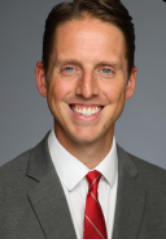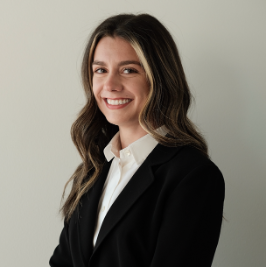Austin Holler graduated from Loyola University Chicago School of Law in 2019. Following graduation, he joined Rakoczy Molino Mazzochi Siwik, LLP as an intellectual property (IP) associate and later moved to K&L Gates, where he now handles patent and trade secret litigation matters across multiple industries. I had the privilege to interview Austin and gain advice for both current and prospective law students.

[The following interview is a paraphrased, edited version of our discussion.]
What made you decide to go to law school?
During undergrad at Notre Dame, I had no clear career path. I studied Chemistry and Classics (Latin) because I enjoyed them. Law school was not always the plan, but having family members in the legal field, including my brother, made it a familiar option.
After undergrad, I worked in sales and marketing, that touched a little on life sciences, in Chicago. During this time, I started thinking seriously about my future and desired more career certainty. My then-fiancée (now wife) and I discussed options, and I realized law school aligned with my skills—writing, analysis, and problem-solving.

Did you know from the start you wanted to pursue IP law?
I had an idea but was not completely sure. Prior to beginning law school, I distinctly remember receiving an email from Professor Ho inviting me to an IP event at Loyola. Attending that event not only solidified my interest in IP law but also showed me that Loyola had a particularly strong IP program. It was my first real exposure to the field, and I was able to connect with Loyola faculty, students, and practicing attorneys who provided valuable insights. That experience introduced me to the different paths within IP law, from patent litigation to prosecution, and I started to see how my science background could be applied in a legal setting.
How did Loyola prepare you for a career in IP Law?
Loyola provided a strong foundation for my career in IP law through both coursework and professional development opportunities. I may be a little bit of an outlier. Instead of taking a broad range of IP courses, I concentrated on patent-focused coursework and practical experiences that aligned with my career goals. Because I knew early on that I wanted to work in patents, I tailored my academic experience to strengthen my technical and legal skills in that area.
What truly set Loyola apart for me, however, was the professional development opportunities outside the classroom. The IP events, networking opportunities, and connections with alumni were instrumental in shaping my understanding of the field. Speaking with attorneys about their work at firms gave me firsthand insight into different career paths within IP law and reinforced my decision to pursue patents.
Beyond coursework, participating in programs like Moot Court, Law Journal, and legal writing courses played a crucial role in my preparation. Strong writing and persuasive skills are essential in IP law, where the ability to communicate complex technical and legal arguments is critical. Moot Court, in particular, helped refine my advocacy skills and I believe it made me a more competitive candidate.
Networking was just as important as coursework. Loyola’s IP community provided access to alumni, firms, and industry events that helped me navigate my career path. I also found that gaining hands-on experience through my judicial externship and summer internship was invaluable in developing practical legal skills, making connections, and easing the transition into practice.
Ultimately Loyola’s combination of rigorous coursework, professional opportunities, and strong IP network gave me the tools and confidence to enter the patent field prepared.
What did your early career look like?
I started my legal career at Rakoczy Molino Mazzochi Siwik, LLP as a summer associate before joining full-time after graduation. The firm focused primarily on life sciences litigation, which gave me valuable experience in handling complex IP matters within life sciences such as pharmaceuticals. However, over time, I realized I wanted to broaden my scope and work with a wider range of technologies beyond the pharmaceutical industry.
What led you to K&L Gates?
When I was looking to lateral in 2023, I wanted to work at a firm that handled a diverse range of technologies within IP law while maintaining a supportive and collaborative environment. K&L Gates stood out because of its strong reputation, global presence, and commitment to professional development.
During the interview process, I quickly realized that the firm fosters an inclusive culture where attorneys are encouraged to grow and take on meaningful work. Also, a former classmate who worked at the firm spoke highly of the professional development opportunities and mentorship available.
Another key factor was K&L Gates’ broad international platform, which allows attorneys to work across regions and practice areas. The opportunity to collaborate with colleagues worldwide has given me exposure to a diverse array of cases and industries, enriching my practice and expanding my expertise. Since joining, I have had the chance to work on matters beyond pharmaceuticals, including telecommunications, which has further strengthened my ability to handle complex IP issues across different technologies.
What networking advice do you have for law students interested in IP?
Just go for it. Introducing yourself for the first time can be intimidating but remember everyone there was in your position once. People at networking events expect students to approach them. I have never met an attorney at a networking event who was not willing to help.
If you are nervous, start small. Introduce yourself, ask for a business card, and follow up later. Loyola alumni are especially supportive. Do not hesitate to reach out by email. Most people appreciate the initiative. One of the best ways to build a connection is to follow up with insightful questions or comments about their work, showing genuine interest. Additionally, attending firm-sponsored events, Intellectual Property Law Association of Chicago (IPLAC) meetings, and bar associations are an excellent way to gain exposure and meet other attorneys.
It is also important to network beyond the legal profession. Connecting with professionals in related industries can provide a deeper understanding of the field in which you practice. Many IP lawyers work closely with technical experts, so developing relationships outside the legal sphere can offer new perspectives and opportunities. Expanding your network to professionals in adjacent industries strengthens your knowledge base and makes you a more well-rounded attorney.
Given your experience, do you have any advice for IP summer associates?
Starting a career in IP law can be both exciting and overwhelming but taking initiative and actively seeking out learning opportunities will set you apart. My advice is to focus on developing strong technical, analytical, and communication skills while also building meaningful professional relationships.
First, focus on producing high-quality work. Attention to detail is critical in IP law, whether you are drafting a patent application, analyzing a trademark dispute, or researching case law. Always double-check your work and ask for feedback to improve.
Second, seek out mentorship early. Having experienced attorneys, professors, or upperclassmen as mentors provides helpful guidance as you navigate IP law. In a firm setting, or during internship opportunities, identify senior attorneys who are open to teaching because learning from their experience will accelerate your professional growth.
Also, do not be afraid to ask questions. No one expects you to know everything right away, and demonstrating curiosity and a willingness to learn will make a strong impression. At the same time, take ownership of your assignments and try to problem-solve before seeking assistance.
Lastly, build strong relationships within your firm and beyond. Developing a solid professional network, including peers, partners, and clients, will open doors and help shape your career. The first few years of practice lay the foundation for long-term success, so embrace every opportunity to grow and refine your skills.

Amy Olyaei
Assistant Blogger
Loyola University Chicago School of Law, J.D. 2026